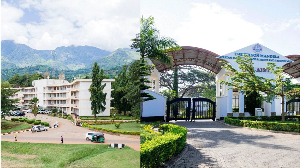Just a concern citizen; nothing more nothing less. A concern citizen of a nation where the fight of corruption appears to be the mantra of all its paramount leaders, but its traits can be found in every conner of the nation.
Corruption, one big elephant in Ghana according to the current finance minister, Ken Ofori Atta causes the county to lose over US$4billion annually; which account for about 20% of Ghana’s budget annually.
Due to the unpleasing magnitude of this canker, all successive governments Ghana have had have one way or the other pledged and preached to combat corruption. It is evident that the so-called attempts to combat corruption have caused the tax payers lump sum of monies over the years even though its results remain under
the dark clouds.
Umpteen Ghanaians have lost hope in this never-ending journey, hence dismissing corruption in our nation is seen as a mirage and a mystery. Also, many Ghanaians are of the belief that the pronouncement “Our government shall combat and put a stop to corruption" is just a rhetoric pronouncement and not a realistic one.
This is the results of the engagement I have had with numerous Ghanaians especially the youth. The unpleasing implication of this is that, the citizenry has lost hope and trust in the corruption combat strategies thus far. The numerous strategies initiated by all the governments for corruption combat have not visibly meet the aspirations and needs of the ordinary Ghanaian. This is because, the scope and scale at which corruption is being combat in Ghana does not reflect what transpire in the immediate environment of majority of Ghanaians.
For instance, the ordinary Ghanaian wants to see the combat of corruption reflecting in the operations of the National Health Insurance Scheme, the
operations of immigrations officers (Passport issuance), operations of the National Service Scheme, operations of the Driver and Vehicle Licensing Authority, among others. Just to elaborate more for comprehension, today huge sums of monies are demanded from people before their passports would be printed for them even after paying the initial legal fees as prescribed by the Ministry of Foreign Affairs.
I have witnessed people having to pay Gh1,200.00 before their passport would be printed for them. Likewise, I have witnessed people waiting for more than or
close to a year before their passport were printed for them just a week after paying the illegal extra fee. Meanwhile, according to the legal provisions, clients are supposed to receive their passport in three months after paying the legal fee of Gh100.00 or Gh150.00.
Again, for every service year, prospective national service personnel are demanded to pay some unreasonable amounts of monies for the so-called special posting. Meanwhile all these are rampant in the public domain and people do it freely like it isn’t illegal in any way. The question myself and other well-meaning ordinary Ghanaians who suffer the consequences of this illicit action ask is that “So what is the manifestation of the so-called corruption combat in Ghana?”.
This is because, we only feel the heat pose by acts of corruption and not the need impacts the combat of corruption. Having said this, I personally share the view that the nature of corruption combat in Ghana is a self-tickling one. And thus, it is not far from being meaningless to the ordinary Ghanaian. I therefore recommend that:
Governments should encourage more social science research to unravel insights of
corruption perception of Ghanaian citizens; this will help guide government future corruption combat policies,
Different cohorts of citizens should be identified and ensure the impacts of corruption combat reflect at their door-step accordingly,
The Ghana Card is a plausible stepping-stone; however, more technical expertise and investment is needed to ensure its effective and efficient integration into all government agencies, and
In considering the Ghana Card as a tool for corruption combat, more emphasis should be placed on the aspirations of the ordinary Ghanian especially the urban poor, rural dwellers, low-income earners and other marginalized groups.
With this, I believe this article would serve as an eye opener for the government and other anti-corruption institutions which will aid them immensely in their next endeavors.
Opinions of Tuesday, 18 July 2023
Columnist: Abdul Rashid Adam















